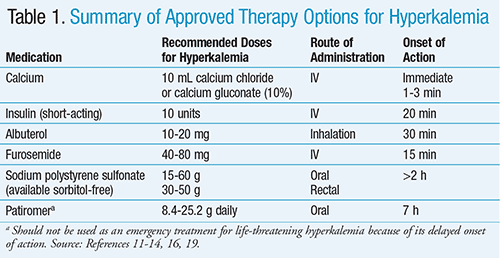Hyperkalemia is a serious and potentially life-threatening disorder. Normal blood potassium levels range from 36 to 48 mEqL.
 Relypsa On Twitter People With Chronic Kidney Disease Have A Higher Risk For Developing High Potassium Hyperkalemia Do You Know The Symptoms Of High Potassium Learn More Https T Co Tmlneo0fca Https T Co Fkzvsu9cnd
Relypsa On Twitter People With Chronic Kidney Disease Have A Higher Risk For Developing High Potassium Hyperkalemia Do You Know The Symptoms Of High Potassium Learn More Https T Co Tmlneo0fca Https T Co Fkzvsu9cnd
High potassium can even cause a heart attack or death.

What are the signs of too much potassium. Addisons disease adrenal insufficiency Angiotensin II receptor blockers. Bananas are a source of potassium. Having too much potassium in your blood can be dangerous.
However having too much potassium in your blood which is called hyperkalemia also can be dangerous. Hyperkalemia or excess potassium in the blood is a potentially fatal medical condition. You may not have any symptoms at all.
Most cases are due to electrolyte imbalance and excretion problems in the kidney. Manage your potassium levels with diet and treatment. The symptoms of high potassium depend on the level of the mineral in your blood.
Too much potassium typically causes arrhythmia or irregular heart beat that is. Many other conditions list numbness as a symptom so if this is a recurring problem its best to see your healthcare professional to find out what the real problem is so you can focus your efforts in the right direction. Signs like fatigue and muscle weakness are easy to dismiss.
Abnormal heart rhythms arrhythmias Nausea. But if your potassium levels are high enough to cause symptoms. Other causes of hyperkalemia include.
Too much potassium in the blood can also cause nerve and muscle problems leading to difficulty breathing weakness tingling numbness and paralysis according to the University of Maryland Medical. We feel sapped of energy and as though we have little to no physical strength. Unfortunately many people do not feel symptoms of high potassium until its too late and their heart health worsens.
Angiotensin-converting enzyme ACE inhibitors. Mild symptoms of too much potassium include an upset stomach nausea diarrhea vomiting and bloating or gas. It is something you should get checked regardless of the suspected cause.
A low-potassium diet and medication changes often bring potassium numbers to a safe level. Abdominal gas and bloating. If you are watching your blood pressure get plenty of potassium in your diet since it can limit the harmful effects of salt on your blood pressure levels.
When too much potassium in your body affects the diaphragm you may experience breathing difficulty or in worse cases you may fail to breathe at all. Hyperkalemia usually results from underlying renal disease that inhibits the kidneys ability to remove excess potassium from. Other symptoms of an overdose distress the heart and circulatory system.
Gastrointestinal symptoms of hyperkalemia can include. If you have symptoms of hyperkalemia particularly if you have kidney disease or are taking medications that raise your potassium level call your doctor immediately. There are numerous conditions that can cause this and one of them is having too much potassium in the body.
In severe cases high potassium levels can cause paralysis as well. Potassium not only acts as a mineral but also an electrolyte and too little or too much can have an adverse reaction in the hands experienced as a numbness or tingling sensation. This can lead to nausea vomiting and the build-up of abdominal gas.
The most common cause of genuinely high potassium hyperkalemia is related to your kidneys such as.
/hyperkalemia-symptoms-5ad4e0b0642dca00363403f9.png)


